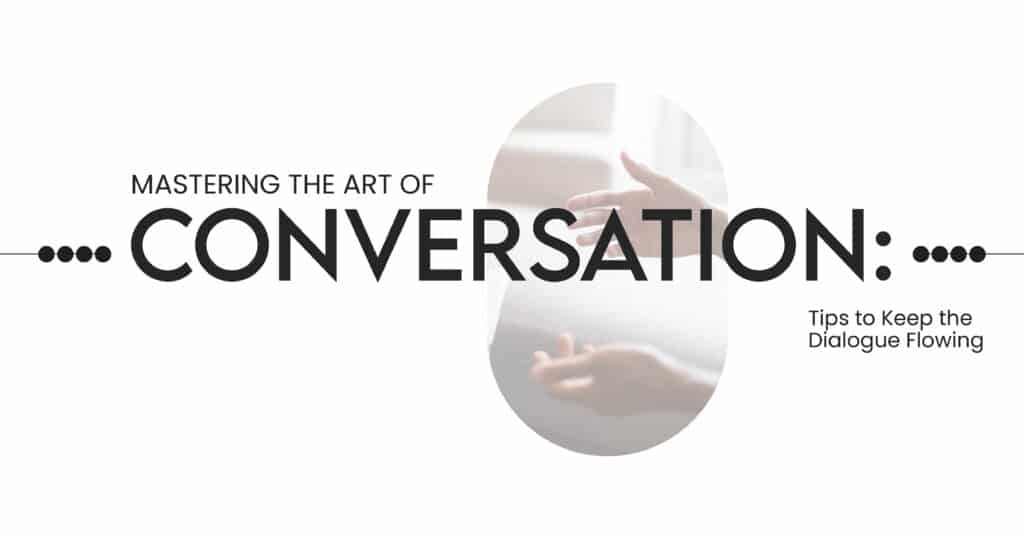A person’s ability to speak well and capture the interest of the individual in front of them helps them build a meaningful relationship, advance professionally, and express their feelings to feel less alone. But what can you do to ensure you are a good conversationalist? And how can you leave a lasting impression?
Let us take a closer look at how communication skills can deepen your personal and professional relationships, explore the significance of empathy during a dialogue, and examine the role of common interests for your bonds with others.
How to Keep a Conversation Going?
Suppose you have a couple of interesting topics and stories up your sleeve. In that case, you can dedicate enough time to diverse hobbies and activities that you and others can talk about with ease, your body language is positive and welcoming, and you combat anxiety that forces you to feel out of place, you can have a pleasant conversation at a party, in the workplace, or in the reception room while you are waiting for your appointment.
Nashville Mental Health
Active Listening as a Foundation for Engaging Dialogue
You can improve your ability to communicate effectively if you practice active listening – acknowledge that you receive the information you are hearing and offer feedback when it is required. This learned skill will minimize misunderstanding between you and another person – provide them with thoughtful responses, make eye contact, avoid interruptions, and open your mind to different points of view and perspectives.
The Power of Open-Ended Questions in Sustaining Conversations
Do not underestimate the significance of open-ended questions – they let you foster a deeper connection between you and another person. Instead of giving them a template of what they should say, you can encourage a detailed response – this will let you gain valuable insight into their mind, understand what motivates them, and find out details you may not have expected to discover.
No matter where your conversation takes place, an open-minded question is a great tool to gather diverse perspectives and identify underlying issues you would not think about, especially if you are not very familiar with a specific topic or field.
Reading Body Language to Gauge Interest and Engagement
How to keep a conversation going with body language? Sometimes, it can be just as important as the words that are coming out of your mouth – effective communicators know how to utilize it alongside verbal exchanges. Here are the key components of body language you should be mindful of:
| Component | Description |
| Eye Contact | While looking someone straight in the eye may be uncomfortable, it is a necessary element of a serious conversation and will help you show you are fully engaged in your dialogue |
| Gestures | Nodding and moving your hands to illustrate certain ideas can be quite smart – you should avoid pointing and crossing your arms since it may be perceived as aggression and unwillingness to talk |
| Facial Expressions | Smile when there is a reason to approve something, raise your brows to show interest, and mirror the emotions of the other person to show they can trust you |
| Handshakes | They mean a lot in a professional context – a firm handshake conveys confidence and shows your readiness to talk |
| Posture | If your posture is upright, it tells others you are confident and engaged – slouching is often associated with low energy and disinterest so you should avoid it |
Identifying and Discussing Common Interests
Naturally, if you are able to pinpoint a topic that is interesting to you and the other person, it can help you build rapport much faster. Pay attention to what other people are saying to identify what they are interested in, do not hesitate to reveal your own hobbies to let others elaborate on their thoughts, and research a particular field, industry, or someone’s background to understand what can help you talk to them for a significant amount of time.

Using Follow-Up Questions to Deepen the Conversation
How to keep a conversation going with follow-up questions? If you are not certain about someone’s response, they captured your interest with a small detail, or the information they might share will result in a better outcome for all parties involved, follow-up questions are what you need. Ask the other person to give an example or explain the cause of a particular event – this will keep your conversation going.
Personal Stories as a Tool for Connection
If you want to share a personal story to connect with someone emotionally, you should follow these steps:
| Step | Description |
| Think About the Structure | If you want your story to resonate with someone else, it needs to have a clear beginning, middle, and end as well as relate to the topic of discussion |
| Put Emphasis on Your Emotions | Instead of simply listing the events, names, and locations, you should aim to evoke the emotions you actually felt in the person in front of you |
| Be Authentic and Funny | Relatability and humor make all the difference – it creates a more engaging and memorable experience for the other individual |
| Remember Your Audience | This is particularly important if you are talking to a colleague, boss, or someone you do not know well – sometimes, a personal story contains details that may not be appropriate in a certain context |
Nashville Mental Health
Empathy and Its Role in Meaningful Exchanges
Empathy lets us grasp the feelings and experiences of other people. Through active listening, validation, judgment-free acknowledgment, and authentic connection we can get closer to another individual – they see you make a genuine effort to understand what they are going through or what they think of which makes your communication effective and meaningful.
Learn More About Maintaining Healthy Relationships at Nashville Mental Health
If you want to figure out how to become an active listener and get rid of anxiety that holds you back when you speak to other people, you should discuss these matters with a therapist. Contact Nashville Mental Health without delay – together we can understand how you can bond with others and help you repair ruptures in your relationships with meaningful conversations.

FAQs
How can active listening improve my conversations and make them more engaging?
If you show the other person you are concentrated on what they are saying, demonstrate validation and respect even if you do not agree with their opinion, and let them know you are interested in effective problem-solving based on the information they gave you, they will be inclined to continue the dialogue with you.
What are some examples of open-ended questions that can help sustain a conversation?
“What was your experience like?”, “How would you approach this?”, “Is there a real-life example I can understand?”, and “How would you describe this situation?” are just a few open-ended questions that can take your dialogue to the next level.
How can recognizing and responding to body language enhance conversational engagement?
When you understand nonverbal cues and know how to ensure the other person gets what you mean without saying any words, you can add depth and context to your conversation. Body language can serve as a tool to convey emotions you cannot express in words and build trust in a personal or professional setting.
What strategies can I use to identify and discuss common interests effectively?
Sharing your passions you are not ashamed of, suggesting joint activities that can let you discover what the other person likes, and looking for patterns that might indicate what they are excited about can create a foundation for a discussion of common interests and hobbies.
Nashville Mental Health
How can incorporating humor into a conversation build rapport and lighten the mood?
A sense of humor makes you attractive, showcases your creativity, and helps everyone around you feel more at ease when the conversation becomes stale.





